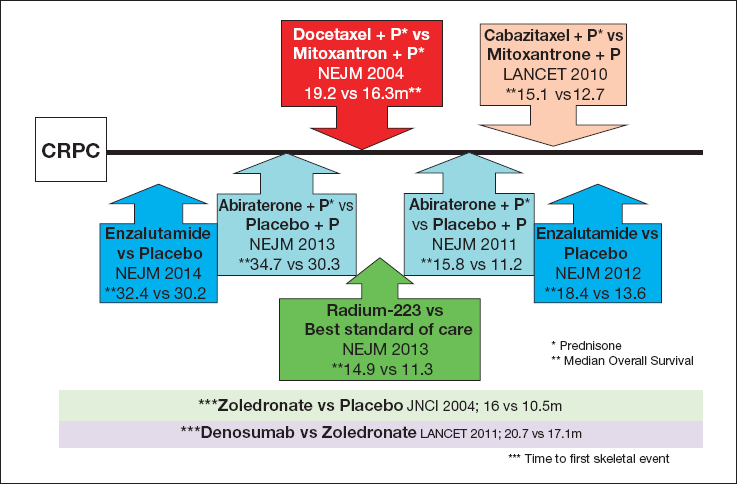BJMO - 2019, issue Special, march 2019
S. Van Bruwaene MD, PhD, B. Engels MD, PhD, B. Sautois MD, PhD
In line with the tradition, the BMUC scientific committee asked a urologist, a radiation oncologist and a medical oncologist to summarize the top stories that were presented during the large urology and oncology meetings of the past year.
Read moreBJMO - 2019, issue Special, march 2019
Brian Chapin, MD
Radical treatment of the primary tumour in patients with metastatic prostate cancer (PCa) has been debated for several decades. The concept of combining systemic therapy with primary tumour cytoreduction has been attempted in different malignancies and recent data also suggest a potential benefit of this strategy in PCa. This include an improved local tumour control, but there are also data indicating that local treatment might alter the natural course of metastatic disease. In his presentation, Prof. dr. Brian Chapin (MD Anderson Cancer Centre, Houston TX, United States) discussed the rationale, the available data and ongoing trials regarding local treatment in patients with (oligo) metastatic PCa.
Read moreBJMO - 2019, issue Special, march 2019
Prof. dr. Karim Fizazi
For several decades the standard of care in patients with poor-risk non-seminomatous germ-cell tumours (NSGCT) has been 4 cycles of bleomycin, etoposide and cisplatin (BEP). However, there are data to support that in patients with an unfavourable decline in tumour markers after a first cycle of BEP, a high-dose chemotherapy regimen should become the standard of care. Dr. Fizazi also insisted on the importance of centralisation of care and provided some new insights for the treatment of patients with germ-cell tumours (GCT) following a relapse.
Read moreBJMO - 2019, issue Special, march 2019
N. Martínez Chanzá MD
Although non-metastatic muscle-invasive bladder cancer (MIBC) can potentially be cured with a trimodal approach in well-selected patients, radical cystectomy remains the reference treatment to date. However, there is a significant rate of recurrence after a radical cystectomy. This risk of recurrence is highly stage dependent and recurrences are commonly seen under the form of distant metastases.1 The predominant cause for these recurrences is the presence of occult micrometastases at the time of cystectomy. For this reason, there is interest in combining definitive surgical or radiotherapeutic treatment for localized disease with systemic chemotherapy for occult metastases. In this respect, several randomized controlled trials (RCTs) assessed the efficacy of peri-operative chemotherapy in the management of MIBC. During the 2019 annual BMUC meeting, dr. Nieves Martínez Chanzá reviewed the available peri-operative treatment landscape in MIBC and discussed emerging data on checkpoint inhibitors and predictive biomarkers in this setting.
Read moreBJMO - 2019, issue Special, march 2019
Prof. dr. Karim Fizazi
More than half of the patients who ultimately die from prostate cancer (PCa) are patients who already have metastases at the time of their diagnosis (de novo metastatic patients).1 Until recently, the treatment of M1 PCa patients consisted of androgen deprivation therapy (ADT). In recent years this treatment paradigm changed following the publication of convincing clinical data demonstrating a significant survival advantage of adding docetaxel or abiraterone acetate (AA) to ADT.2–8 During BMUC 2019, Prof. dr. Karim Fizazi (Institut Gustave Roussy, Paris, France) gave an overview of the latest developments in treatment of M1 PCa patients.
Read moreBJMO - 2019, issue Special, march 2019
Prof. dr. Silke Gillessen
Since 2010, several new agents have joined the armamentarium for the treatment of metastatic castration-resistant prostate cancer (mCRPC) (Figure 1).1–7 This had dramatically improved the outcome for patients with mCRPC, but also confronts physicians with the question of how to optimally sequence the different therapeutic options. In addition to this, the increasing use of abiraterone acetate (AA) and docetaxel (and in the near future perhaps also enzalutamide) in the castration-sensitive metastatic prostate cancer (PCa) setting will further complicate this therapeutic sequencing. During BMUC 2019, dr. Silke Gillessen gave an overview of the available clinical data that can be used to steer the treatment choices in the mCRPC setting. Unfortunately, none of the pivotal trials evaluating the novel treatment agents compared the experimental agent against a regimen that would be considered standard of care nowadays. Moreover, none of the trials included patients who received androgen deprivation therapy (ADT) plus AA or docetaxel in the hormone sensitive setting.

FIGURE 1. Approved systemic therapies for mCRPC.
Read moreBJMO - 2019, issue Special, march 2019
S. Siva MD, PhD
Immunotherapy has become a successful modality in the treatment of a number of cancers. Still, generally not more than one third of the patients respond well to this type of therapy. To improve the outcome, researchers are evaluating combinations with other modalities, such as radiotherapy. During BMUC 2019, radiation oncologist dr. Shankar Siva presented the results obtained with local radiotherapy and immunotherapy, and discussed the optimal sequence, timing and dosing of this combination treatment.
Read more